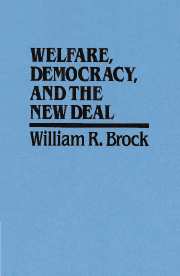9 - Debits and credits
Published online by Cambridge University Press: 07 December 2009
Summary
When the National Conference of Social Work met in 1940, a wide review of the past, present, and future of public relief was on the agenda. Harry Greenstein, the former state relief administrator for Maryland, declared:
When the Federal Government took the position that direct relief was the primary responsibility of state and local governments, something vital was taken out of the relief program.
The result had been “a low grade of pauper treatment over wide areas” and, for those not employed by the WPA, “a precarious existence dependent upon inadequate and often non-existent local resources.”
Edith Abbott called her address to the same meeting “Relief, the No Man's Land and How to Reclaim It” but could see no hope of improvement without federal intervention. Using different imagery she spoke to the Illinois Conference on Social Welfare on “the disinherited relief program”:
The tenth summer is over – the tenth harvest is gathered – and we are still here – after ten years – with relief never more inadequate than it is at the present time. Things have gone steadily from bad to worse since the fatal decision about “ending this business of relief” was made by the federal government in 1935.
To illustrate the point she cited figures from Chicago. In the early days of the FERA, the average home relief per case had been $32.75 a month; it rose to $40.28 during 1934, then fell to $28.52 in 1937 and to $23.54 by 1939.
- Type
- Chapter
- Information
- Welfare, Democracy and the New Deal , pp. 326 - 369Publisher: Cambridge University PressPrint publication year: 1988



